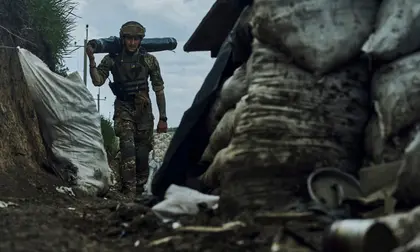Wagner chief Yevgeny Prigozhin reported on the weekend that Russia has completely taken Bakhmut, which has been the object of fierce fighting for nine months. But the situation remains unclear, as Ukraine disputes his account and on Monday again reported ongoing fighting on the front lines. For commentators, these contradictory statements provide an opportunity to contextualize the intense battle over the city in Donbas.
Like in times we thought were long over
Switzerland’s The Neue Zürcher Zeitung shakes its head at the fierceness of the fighting around Bakhmut:
JOIN US ON TELEGRAM
Follow our coverage of the war on the @Kyivpost_official.
“The battle for Bakhmut was one that had no longer been thought possible. Russian infantry left their trenches and rushed to their deaths in 'human waves' until the defenders were overrun. In the opinion of many military experts, this kind of warfare, which sometimes resulted in several hundred casualties per day, was a thing of the past. They were wrong. Even in the 21st century the grimace of war is as ugly as ever. ... With unrelenting brutality. ... Russia has achieved a victory. For Kyiv this is a bitter setback.”
Russia can't capitalize on its success
For Poland’s Tygodnik Powszechny, the capture of Bakhmut is a Pyrrhic victory:
“The Ukrainian side undoubtedly also suffered heavy losses, according to some only slightly fewer than on the Russian side, but apparently the goal was worth the sacrifice. For after nine months of this 'meat grinder' (as the Russians say openly and the Ukrainians say quietly), the Russian side is unlikely to have enough forces left to take advantage of the capture of the city and launch a new strike on Kramatorsk and Slovyansk to achieve even the minimal goal declared by Putin in February 2022 - namely of conquering the entire Donbass.”

‘We Need to End That Horrible, Horrible War’ – Ukraine at War Update for Dec. 23
Active combat as leverage
The arduous defensive in Bakhmut has benefited Ukraine as a whole, Russian journalist Kirill Rogov writes on Facebook:
“Ukraine convinced the West of the need to supply it with modern air defence systems and, far more importantly, modern heavy equipment for ground operations and trained soldiers to use it. And then it waited for the deliveries. Could the Ukrainians have achieved all this if there had been no active fighting during those months? Perhaps. But a lull on the front lines would have cooled the Ukraine issue and given a boost to the 'ceasefire party' in the West. Supplying heavy weapons in the face of a subsiding conflict would have seemed a far less convincing idea.”
Victims of their own propaganda
Writing in Estonia’s Eesti Päevaleht, historian Olaf Mertelsmann comments on the willingness to make such sacrifices for what is in many ways an insignificant town:
“For both sides, the symbolic and propagandistic value is probably greater than the tactical or strategic significance. ... The Russian side has fallen into the trap of making Bakhmut an important propaganda issue. Then there is no way around sacrificing soldiers even when there is nothing left to win. A historical example of this is the battle of Stalingrad. The city was of great propagandistic importance for both Stalin and Hitler. ... The fighting cost the lives of up to a million soldiers and civilians. ... In the process the German efforts became completely pointless, since the 6th Army was encircled.”
War is a business for Prigozhin
The Wagner boss is fighting for his own goals and not for Russia, Oleksiy Melnyk of the think tank Razumkov Centre argues in Ukraine’s NV:
“For Prigozhin, war is a business and Bakhmut is his business project. They say he has big political ambitions. That may be, but for him the government is also and above all an instrument to protect and expand his business. In implementing the Bakhmut project, the businessman Prigozhin is working exclusively for his own interests. ... Prigozhin couldn't care less whether his actions are in line with the overall plan or military expediency criteria, which is probably one of the reasons for his conflict with General Gerasimov.”
See the original here.
You can also highlight the text and press Ctrl + Enter






